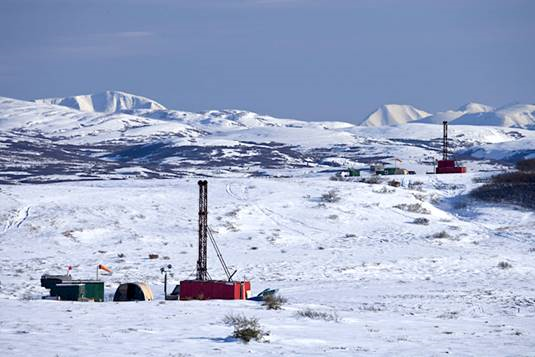Americans for Limited Government, along with 65 other conservative groups, sent a letter to President Trump this week urging him not to allow political meddling in the permitting process for the Pebble Mine in Alaska.
Just hours after sending the letter of support for the embattled project, Tom Collier, CEO for the Pebble Limited Partnership, which is owned by Canada-based Northern Dynasty, resigned following the release of recorded comments in which it says he “embellished” relationships with elected and regulatory officials.
A Pebble spokesman says Collier will be replaced on an interim basis by the company’s former CEO John Shively.
“John Shively is the exact kind of steady hand that Pebble Mine needs to steer it to completion,” said Rick Manning, President of Americans for Limited Government, a long-time supporter of the project. “His reputation as a lowkey executive who gets things done will serve the company and our nation well as this mine is developed and we take a giant step towards rare earth mineral independence.”
The upheaval comes amidst concerns of high-level political interference in the mine. Insiders believe White House meddling has resulted in further regulatory delays aimed at killing the project which would be the largest gold and copper mine in North America. Pebble Mine also has a large deposit of rhenium used in military aircraft and is a key component in aircraft engines.
The letter, spearheaded by the Conservative Action Project, said these delay tactics harken back to “the bad old days when the Obama administration misused its Clean Water Act authority and used bogus science to veto the project before an Environmental Impact Statement (EIS) had even been submitted.”
In July, the U.S. Army Corps of Engineers released its final environmental impact statement (E.I.S.) for the Pebble Mine project by concluding that the project would not lead to “long-term changes in the health of the commercial fisheries in Bristol Bay,” under normal conditions.
The E.I.S. noted that the mine would provide significant tax revenue to Alaska, create well-paying jobs in an increasingly poverty-stricken region, and “provide a domestic resource of raw materials lowering the United States reliance on foreign sources.”
However, before the Corps made its final record of decision, old claims were again raised that the mine would threaten the salmon and destroy hunting and fishing opportunities for wealthy sportsmen. All of these claims were fully considered by the Army Corps in the E.I.S. process and dismissed on the basis of overwhelming scientific evidence.
As a result of this meddling, in August, the Army Corps of Engineers wrote that Pebble Mine would “cause unavoidable adverse impacts to aquatic resources” in the area and is requiring the mine “in-kind compensatory mitigation within the Koktuli River Watershed … [to] compensate for all direct and indirect impacts caused by discharges into aquatic resources at the mine site.”
In short, the Corps reversed itself by throwing up a roadblock in the mine’s progress, just one month after issuing a favorable environmental impact report.
“As conservatives, we applaud the progress President Trump has made toward achieving energy independence for the first time in 60 years,” noted Rick Manning, President of Americans for Limited Government. “We support his administration’s broad regulatory reform agenda and his continuing push to remove obstacles to environmental permitting of natural resource and infrastructure projects. But this regulatory delay appears to be a clear case of political interference. It was inappropriate when President Obama did it and it’s still inappropriate today.”
So, while the Pebble Mine prepares to submit its mitigation plan, Americans for Limited Government is hopeful the regulatory process will move forward in strict accordance with the law and without further delays based on groundless claims.
Were political meddling to kill the mine, it would undermine one of President Trump’s campaign promises, to create jobs by rolling back burdensome and onerous federal regulations. It would also discourage the mining industry, which is at a low ebb in the United States as the result of decades of regulatory suffocation, from making other multi-billion-dollar investments to take advantage of America’s vast mineral potential.
Pebble Mine is vital to the economic future for the people living in the Bristol Bay watershed (an area the size of Ohio) and for the State of Alaska. It is located in a remote area where there are few jobs for native villagers and where endemic poverty has fostered serious social dislocations. The recent collapse in oil prices is a painful reminder that Alaska’s economy is overly dependent on oil production and must diversify if it is to flourish in the future.
The mine’s economic benefits go far beyond the jobs in Alaska. The Pebble ore body contains colossal quantities of copper, gold, and molybdenum, as well other strategic minerals like rhenium used in aircraft engines. The mine will provide minerals that are critical to high-tech industries in America and the world and create tens of billions of dollars of economic activity across the country.
Catherine Mortensen is the Vice President of Communications at Americans for Limited Government.







